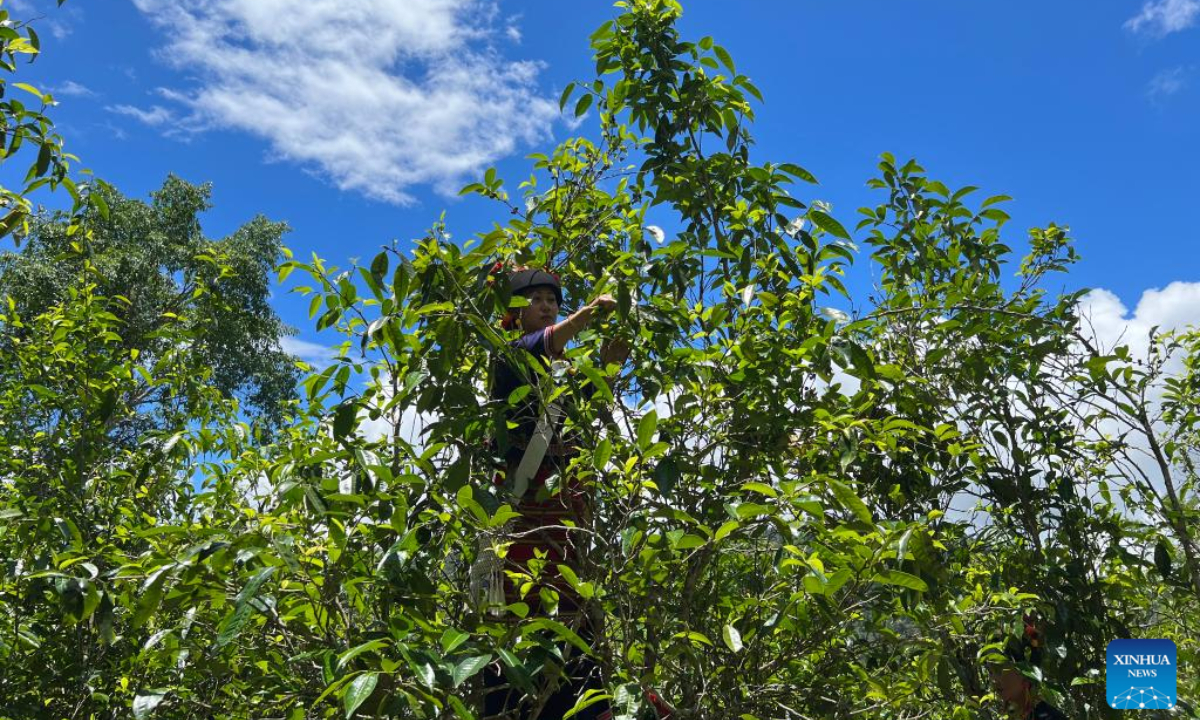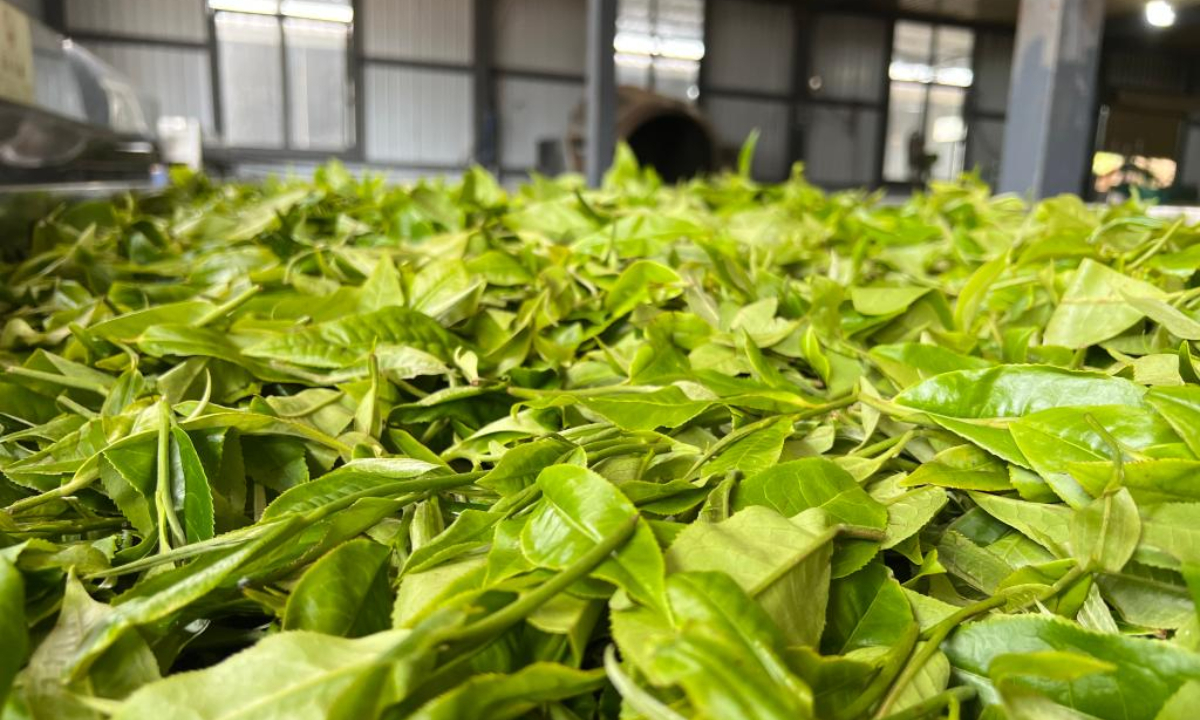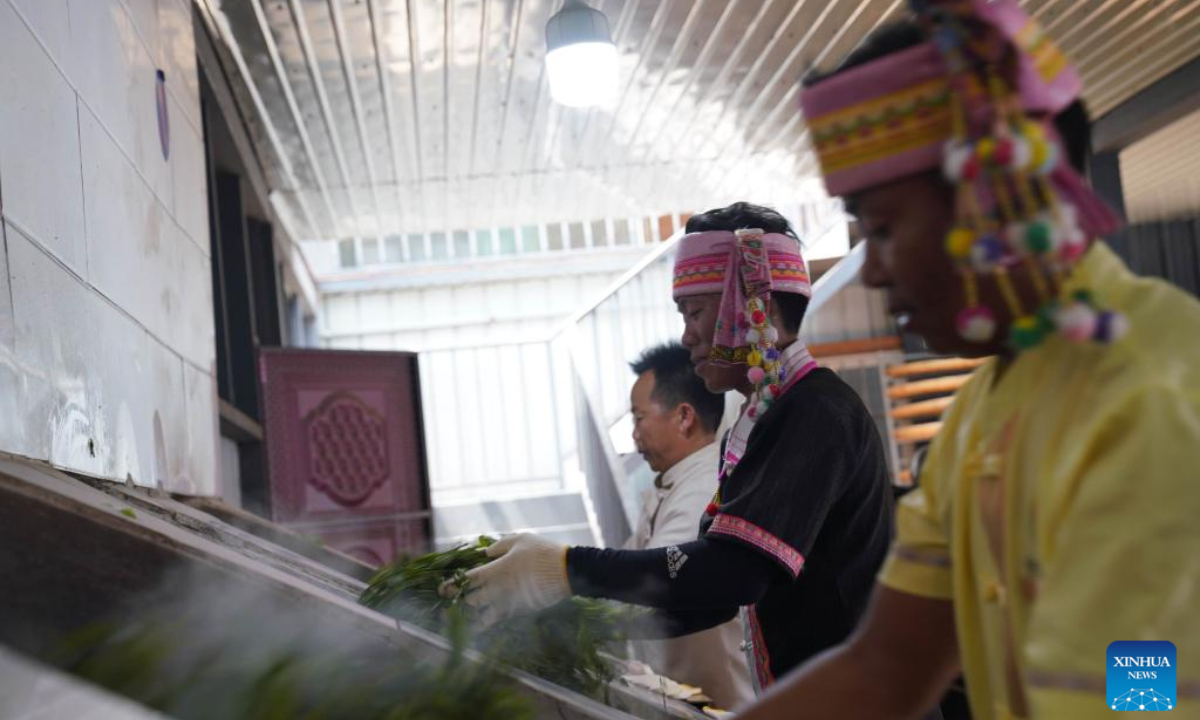
A villager picks tea leaves in Old Man'e Village, Menghai County, southwest China's Yunnan Province, June 7, 2023. Photo:Xinhua
Though spring, the peak time of year for tea harvesting, has passed, farmer Yan Yanjiao finds himself still busy, powering his SUV along narrow dirt roads leading to tea gardens on mountain slopes.
The 31-year-old heads the village of Old Man'e in the Blang Mountain ethnic township, located in Menghai County, Yunnan Province along the China-Myanmar border. Inhabited by over 1,000 people, the village boasts large areas of Pu'er tea forests at an elevation of 1,500 meters above sea level.
Pu'er is a variety of fermented tea traditionally produced in Yunnan. In this village, tea trees blend with lush tropical flora and are somewhat hard to spot, presenting a starkly different scene from neat rows of tea bushes. The predominant number of ancient tea trees, generally defined as over 100 years old, attracts eager buyers who have a penchant for old tea trees.
"April is the busiest. About 3,000, or maybe 4,000 people would flood into our village, plucking, making and buying spring tea. The village is filled with cars from almost everywhere, and buyers definitely need to place orders early for good-quality leaves," said Yan, Communist Party chief of the village.
The cash crop
Old Man'e village has a history of over 1,300 years and its tea-planting and drinking culture has been passed down through generations. Most villagers are members of the Blang ethnic group, one of the 56 ethnic groups in China. As descendants of the ancient Pu people, the Blang live at high altitudes and practice agriculture, cultivating primarily rice, cotton, sugar cane, and tea in the rich soils of their tropical environment. Tea has become an important ingredient in their cultural life. Local sacrificial activities, weddings and other rituals often require the use of tea and related ceremonies.
Now, a tea house and a glass room for drying tea leaves are fixtures in almost every household.
"Pu'er tea in this village has an overbearing bitter taste, but the bitterness does not linger and a certain sweetness comes back soon," said Zeng Tieqiao, deputy director of the Tea and Green Food Industry Development Center in the county, and also a tea expert.
The average price of tea deriving from old trees can fetch 2,000 yuan (about 285 U.S. dollars) to 3,000 yuan per kilo, becoming a "cash cow" for villagers, he said.
Old Man'e is catching up with Old Banzhang, a village already famous for old tea trees and located about 15 km away. "These centuries-old villages are now believed to offer premium quality tea, and their village names are becoming de facto brand names," said Zeng.
The Blang mountain villages' tea business took off in the past decade. Poverty-relief campaigns brought tea enterprises to market tea for farmers, built roads and other infrastructure, and improved lives in the once-impoverished villages.
Prior to its success, families could barely make ends meet if they only grew tea trees. "When I was young, fresh tea leaves were only three or four yuan per kilo. Tea-planting was not more profitable than growing vegetables," said Yan Kan'er, a 36-year-old villager. Yan is a common surname in the village.
About 20 years back, his family had about seven hectares of tea trees, and still had to grow other crops to survive.
Now more than 40 preliminary tea-processing facilities have been built in the village. Tea makers use smart machines for many processes, such as picking out weeds and withered leaves, and yet still retain traditional methods, in which tea-making masters rumble leaves in giant iron pots heated by firewood.
Rural revamp
Yan Yanjiao, sturdy and deeply-tanned, spends the day checking on tea plantations to learn about output, and shares livestream sessions at night on his Douyin account, "Old Man'e 75," which is also the address of his home. He has over 20,000 followers.
Yan was elected the village Party secretary in 2019, after three years in the tea business. "After college graduation, I sold fast food, fruit and jewelry, and I did not want to come back to the mountains. I did not return until 2016," he said.
Yan studied ways to make tea water more clear by adding certain procedures. The subtle change in taste was welcomed by buyers.
"On one hand it is the supply side. I need to guide fellow villagers to plant the trees well, with proper watering and refraining from using fertilizers. The other is the demand side. It is important to understand what the tea-drinkers need," he said.
Having yet to develop a similar savviness in livestream marketing, farmer Yan Jiaoxiang still relies on word-of-mouth among his clients. "When I make top-quality leaves, I mail some to my clients to try out and if they like it, they will buy it," he said.
Though this year's spring drought slashed output, sales have not been affected, he said. "The average price is about 800 yuan per kilo. Not very bad," he added.
Considered the world's provenance of tea trees, Yunnan Province is located at the starting point of the ancient Tea Horse Route.
In 2021, the province's tea industry generated 107 billion yuan in output. According to a plan, by 2025, Yunnan's tea planting area will be stabilized at around 500,000 hectares, with an annual production of 500,000 tonnes. It plans to gradually expand its green and organic tea plantations.
Though tea leaves can be picked almost year round, villagers are advised to skip summer picking season to let the trees "rest." "Tea trees have life, just like humans. We need to serve the trees well, and they will reward our efforts," said Yan Yanjiao.

This photo taken on June 7, 2023 shows tea leaves being air-dried in Old Man'e Village, Menghai County, southwest China's Yunnan Province. Photo:Xinhua

Villagers make tea leaves in Old Man'e Village, Menghai County, southwest China's Yunnan Province, June 7, 2023. Photo:Xinhua

Villagers process tea leaves in Old Man'e Village, Menghai County, southwest China's Yunnan Province, June 7, 2023. Photo:Xinhua
